|
|
|
Sort Order |
|
|
|
Items / Page
|
|
|
|
|
|
|
| Srl | Item |
| 1 |
ID:
069084
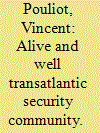

|
|
|
| 2 |
ID:
108089
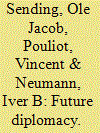

|
|
|
| 3 |
ID:
068758
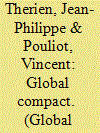

|
|
|
| 4 |
ID:
158281
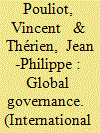

|
|
|
|
|
| Summary/Abstract |
Why is it so complicated to achieve collective action in global governance? This article focuses on one explanatory factor, according to which the global stage is pervaded by normative divisions. Our article helps advance this argument in three ways, by specifying the nature, scope, and mechanics of the global value struggle. First, we show that the distinct visions that clash in the conduct of global governance are formulated in a peculiar idiom of universal values based on contending and polysemous conceptions of the common good. Second, we highlight the ubiquity of universal value claims in global governance debates; regardless of their specific nature or standing, actors of all stripes defend their positions by referring to a certain understanding of the general interest. Third and finally, we specify the mechanics of the global value struggle as actors use the idiom of universal values to communicate and justify their viewpoints publicly. We illustrate our framework by looking into the debates that have structured two prominent cases of global policymaking at the United Nations: the adoption of the Millennium Development Goals and the negotiations over the reform of the Security Council. Overall, the article helps make sense of a counterintuitive dynamic in contemporary world politics: as it attempts to depoliticize global governance, the idiom of universal values actually ends up bringing politics back to the fore.
|
|
|
|
|
|
|
|
|
|
|
|
|
|
|
|
| 5 |
ID:
145676
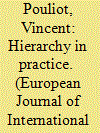

|
|
|
|
|
| Summary/Abstract |
In today’s world, a significant portion of international security politics is conducted through multilateral channels, often from the halls of international organisations such as the United Nations or NATO. This article theorises and empirically documents the production, reproduction, and contestation of local diplomatic hierarchies that practitioners often call ‘international pecking orders’. According to conventional wisdom in IR, the sources of international hierarchies are primarily structural, stemming from the interstate distribution of (material) capabilities. Yet the growing prevalence of multilateral diplomacy in the governance of international security generates distinctive forms of social stratification organised around a struggle for diplomatic competence. As they pursue their instructions and manage security politics, state representatives posted to international organisations make use of the opportunities and constraints of a given situation and compete for rank through the display of practical know-how. The article illustrates this process by looking at how a key set of multilateral practices lend themselves to pecking order dynamics, from esprit de corps to reporting through brokering. By taking the multilateralisation of security politics seriously, the article shows that international hierarchy, far from an unobservable reality, is actually part of parcel of each and every practice that makes the world go round.
|
|
|
|
|
|
|
|
|
|
|
|
|
|
|
|
| 6 |
ID:
175815
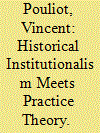

|
|
|
|
|
| Summary/Abstract |
The selection process leading to the appointment of Antonio Guterres as Secretary-General of the United Nations gave way to unprecedented practices in world politics, such as public hearings with candidates. A textbook case of what historical institutionalism calls “layering,” this episode of institutional development features intriguing puzzles, including its timing, form, and limits. Drawing on historical institutionalism and practice theory, I develop a “pulling” theory of agency that complements intentionalist accounts. The webs of practices that agents find themselves in afford certain actions over others, orienting the push of interests. I infer three mechanisms—relational crossover, competence transfers, and pushback—and show how a set of nine practices, available at the UN in 2015–2016 but not in earlier episodes, account for the specifics of the recent renewal of the Secretary-General's selection procedure. A full explanation of this critical case of institutional change is impossible without understanding how agents struggled with one another under the pull of the UN web of practices, affording some innovations but not others.
|
|
|
|
|
|
|
|
|
|
|
|
|
|
|
|
| 7 |
ID:
141723
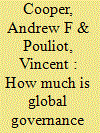

|
|
|
|
|
| Summary/Abstract |
Is the G20 transforming global governance, or does it reinforce the status quo? In this article we argue that as innovative as some diplomatic practices of the G20 may be, we should not overstate their potential impact. More specifically, we show that G20 diplomacy often reproduces many oligarchic tendencies in global governance, while also relaxing club dynamics in some ways. On the one hand, the G20 has more inductees who operate along new rules of the game and under a new multilateral ethos of difference. But, on the other hand, the G20 still comprises self-appointed rulers, with arbitrary rules of membership and many processes of cooption and discipline. In overall terms, approaching G20 diplomacy from a practice perspective not only provides us with the necessary analytical granularity to tell the old from the new, it also sheds different light on the dialectics of stability and change on the world stage. Practices are processes and as such they are always subject to evolutionary change. However, because of their structuring effects, diplomatic practices also tend to inhibit global transformation and reproduce the existing order.
|
|
|
|
|
|
|
|
|
|
|
|
|
|
|
|
| 8 |
ID:
098288
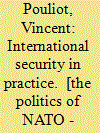

|
|
|
|
|
| Publication |
Cambridge, Cambridge University Press, 2010.
|
| Description |
xv, 282p.
|
| Standard Number |
9780521122030
|
|
|
|
|
|
|
|
|
|
|
|
Copies: C:1/I:0,R:0,Q:0
Circulation
| Accession# | Call# | Current Location | Status | Policy | Location |
| 055188 | 327.4701821/POU 055188 | Main | On Shelf | General | |
|
|
|
|
| 9 |
ID:
099792
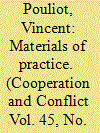

|
|
|
|
|
| Publication |
2010.
|
| Summary/Abstract |
In this article I argue that the Cartesian dualism informing dominant theories of International Relations (IR) has limited analytical purchase at the level of practice. The materials that enable and constrain contemporary diplomatic practices between NATO and Russia seamlessly combine natural, cultural and organizational artefacts: nuclear warheads take on a symbolic life of their own; linguistic formulations transform into 'things'; and committee meetings inscribe intersubjective dynamics with a new materiality. To materialist theories à la neo-realism, practice theory shows that material objects matter not because they have an immanent meaning, but rather because, in becoming part of social relations, they acquire a form of agency of their own, making people do things they would not have done otherwise. To IR constructivism, this article demonstrates that it is not only people who attach meanings to things; things also attach meanings to people. Enmeshed in social relations, material objects often acquire an epistemic life of their own that may affect, in turn, the very people who constructed them.
|
|
|
|
|
|
|
|
|
|
|
|
|
|
|
|
| 10 |
ID:
102937
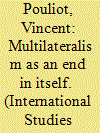

|
|
|
|
|
| Publication |
2011.
|
| Summary/Abstract |
Students and practitioners of world politics need to assess the value of multilateralism not only as a means to an end, but also as an end in and of itself. The functional view, according to which multilateral channels are worth pursuing only insofar as they allow actors to gain influence on the global stage or produce tangible and immediate results in fighting global harms, is incomplete. As a global governance practice characterized by an inclusive, institutionalized, and principled form of dialog, the multilateral procedure generates a number of processual benefits-mutually recognizable patterns of action, typically moderate solutions, and legitimate policies whose large ownership eases their effective implementation-which, taken together, strengthen the political impetus for global cooperation, regardless of the policies adopted. Routinized, nondiscriminatory, and comprehensive political dialog is a pragmatic template for enhancing global governance that can be implemented here and now, as recent developments at the United Nations indicate.
|
|
|
|
|
|
|
|
|
|
|
|
|
|
|
|
| 11 |
ID:
079911
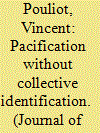

|
|
|
|
|
| Publication |
2007.
|
| Summary/Abstract |
Does the emergence of a security community require a collective identity? This constitutive relationship has been hypothesized by prominent scholars from Deutsch to Adler & Barnett. Yet the Russian-Atlantic case shows that collective identification is not a necessary condition for a nascent security community to emerge. In less than two decades, the relationship between Russia and the transatlantic community has quickly transformed from a deep-seated rivalry structured by the specter of mutual assured destruction to a partnership in which the possibility of military confrontation has undeniably receded. Although bones of contention and power struggles continue to abound, empirical indicators attest to the emergence of a nascent Russian-Atlantic security community. But survey data also show that Russian and Western peoples do not meaningfully identify with one another. While the lack of we-ness certainly helps explain the striking instability of the post-Cold War rapprochement between Russia and the transatlantic community, it also recalls the need for constructivists to pay attention to other variables than mutual representations in the study of international peace. As a way forward, the article advocates a practice turn in the study of security communities: peace exists as a social fact when diplomacy becomes the self-evident practice among security elites to solve interstate disputes
|
|
|
|
|
|
|
|
|
|
|
|
|
|
|
|
| 12 |
ID:
139576
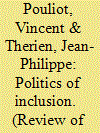

|
|
|
|
|
| Summary/Abstract |
The debate on the reform of the Security Council can be conceptualised as the most recent episode in the evolution of World Governing Councils (WGCs), that is, the highest-level intergovernmental bodies charged with regulating the international use of violence. Building on a historical comparison of key formative and transformative moments – 1815, 1919, 1945, and post-Cold War – we argue that the modern evolution of WGCs is characterised by increasing inclusiveness. More specifically, we show that the number of participants involved in deliberations has constantly risen; that legitimating principles have gradually tilted in favour of ‘input legitimacy’; that the constitutive rules and procedures have steadily gained in transparency; and that the WGCs themselves have comprised an expanding membership with a decreasing number of veto points. At the theoretical level, these converging trends can be explained by the existence of a ‘ratchet effect’ whereby new norms and practices of inclusion accumulate over time. However concrete and long lasting, the democratic gains registered in the process must be cast in terms of historically specific politics and struggles rather than in terms of lofty ideals promoted by altruistic norm entrepreneurs.
|
|
|
|
|
|
|
|
|
|
|
|
|
|
|
|
| 13 |
ID:
141721
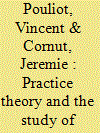

|
|
|
|
|
| Summary/Abstract |
This introductory article explores the multiple synergies between international practice theory and diplomatic studies. The timing for this cross-fertilizing exchange could not be better, as the study of diplomacy enters a phase of theorization while practice scholars look to confront the approach to new empirical and analytical challenges. The article first defines diplomacy as a historically and culturally contingent bundle of practices that are analytically alike in their claim to represent a given polity to the outside world. Then the key analytical wagers that practice theory makes are introduced, and debates currently raging in the discipline are briefly reviewed. Next, it is suggested what a practice theory of diplomacy may look like, discussing a variety of existing works through their common objective to explain the constitution of world politics in and through practice. Finally, a few research avenues to foster the dialogue between diplomatic studies and practice theory are outlined, centered on the nexuses of transformation and reproduction, rationality and know-how, and the technical vs. social dimensions of practices –diplomatic or otherwise.
|
|
|
|
|
|
|
|
|
|
|
|
|
|
|
|
| 14 |
ID:
078286
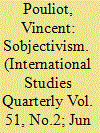

|
|
|
|
|
| Publication |
2007.
|
| Summary/Abstract |
This article outlines a "sobjectivist" methodology that is specifically geared toward the constructivist style of reasoning. The main argument is that constructivist inquiries need to develop not only objectified (or experience-distant) but also subjective (experience-near) knowledge about social and international life. This requirement derives from the fact that constructivism is a postfoundationalist style of reasoning which emphasizes the mutually constitutive dialectics between the social construction of knowledge and the construction of social reality. By implication, a constructivist methodology should be inductive, interpretive, and historical. The methodical practice of sobjectivism follows a three-step logic from the recovery of subjective meanings to their objectification thanks to contextualization and historicization. A brief discussion of the security-community research program illustrates what sobjectivism looks like in practice. Overall, not only does the development of a consistent methodology systematize the practice of constructivist research, it also fosters engagement and dialog with other international relations approaches. By clarifying where constructivism falls on issues of validity, falsifiability, and generalizability, this article intends to enhance mutual legibility among competing methodologies.
|
|
|
|
|
|
|
|
|
|
|
|
|
|
|
|
| 15 |
ID:
124430
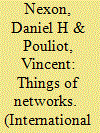

|
|
|
|
|
| Publication |
2013.
|
| Summary/Abstract |
We come to this forum not to advocate for actor-network theory (ANT) but to raise friendly questions about its role in International Relations (IR). As outsiders to ANT, we recognize that these issues may be addressed within that broader literature. But since we are proponents of the use of frameworks that share with ANT a commitment to the analytical priority of processes, relations, and practices, we also have a particular interest in its development within our field
|
|
|
|
|
|
|
|
|
|
|
|
|
|
|
|
| 16 |
ID:
104081
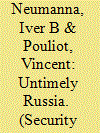

|
|
|
|
|
| Publication |
2011.
|
| Summary/Abstract |
This article draws on Pierre Bourdieu's sociology to explain how a lack of fit between a repertoire of bodily practices accumulated through history, on the one hand, (here, Russian habitus) and the field in which it is employed, on the other, (here, diplomacy) can take shape in world politics. Such "hysteresis" provides a longue durée reading that challenges both the realist idea that similar outcomes are due to invariant structures and the constructivist idea that structures "socialize" states. Social stability stems from agency, more specifically, from habitus. Our empirical examples are breaking points in Russian relations with neighbors: the Rus' and the Eurasian steppe empires (ca. 800-1500), Muscovy's diplomatic interactions with Europe, and Russia's bid to join European international society and situation during the twentieth century. In each case, Moscow's relentless quest for equal status prompted quixotic practices that were often dismissed by Western countries and hampered the security of both parties.
|
|
|
|
|
|
|
|
|
|
|
|
|
|
|
|
|
|
|
|
|